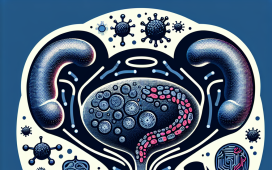Bladder cancer is a prevalent form of cancer that affects numerous individuals worldwide. Understanding the basic signs and symptoms of bladder cancer is crucial for early detection
When it comes to serious health issues, early detection is crucial. Bladder cancer is no exception. While it’s easy to overlook subtle signs, knowing the symptoms can make a life-saving difference. So, what should you watch for?
Table of Contents
1. What Is Bladder Cancer?
Bladder cancer begins when abnormal cells in the bladder grow uncontrollably. It’s more common in older adults, but anyone can be affected. Early detection is critical because treatment is far more effective in the initial stages.
Metaphor: Think of your bladder as a security system. When something goes wrong, early alarms (symptoms) go off to warn you that help is needed.
2. Early Warning Signs to Watch For
How do you know when to be concerned? The first signs can be subtle but become more noticeable over time. Let’s break down the symptoms you should never ignore.
3. Blood in the Urine (Hematuria)
One of the most common and alarming signs is blood in the urine. It may be bright red or rusty in color, but in some cases, it’s so faint that only a lab test can detect it.
Key Point: Don’t dismiss blood in your urine, even if it comes and goes. It’s a strong signal that something is wrong, and bladder cancer could be a culprit.
4. Frequent Urination and Urgency
Do you find yourself rushing to the bathroom more than usual? Or feeling an urgency to go but not passing much urine? Changes like these can indicate bladder cancer, especially if they occur suddenly and persist.
5. Painful Urination
Experiencing discomfort or a burning sensation when urinating isn’t just a sign of a urinary tract infection. If the pain is severe or doesn’t go away with standard treatments, it’s worth investigating further.
Advice: Encourage loved ones to see a doctor if painful urination lasts for more than a week. Early medical advice can make all the difference.
6. Lower Back Pain
Lower back pain, particularly near the sides of your body, can be a symptom of advanced bladder cancer. While many things can cause back pain, if it’s persistent and unexplained, it’s time to pay attention.
For more detailed insights, visit Pharma Marketing.
7. Changes in Urination Habits
Notice anything different about your usual bathroom habits? Maybe you’re urinating less or waking up multiple times at night. These changes, though subtle, can point to a problem with your bladder.
8. Advanced Symptoms to Be Aware Of
If bladder cancer progresses, symptoms can become more severe. These may include weight loss, bone pain, and swelling in the lower legs. By this point, the cancer may have spread to other organs, making treatment more complex.
Important Note: The earlier you catch bladder cancer, the better your treatment options will be.
9. Risk Factors You Should Know
Understanding risk factors can empower you to make healthier choices. Smoking, exposure to certain chemicals, chronic bladder inflammation, and a family history of bladder cancer increase your risk.
Fun Fact: Did you know that smokers are three times more likely to develop bladder cancer than non-smokers?
For more community-driven discussions, check out HealingWell.
10. When to See a Doctor
When is it time to take symptoms seriously? If you notice any of the signs mentioned, especially blood in your urine or severe pain, don’t wait. See your healthcare provider for a thorough evaluation.
Reminder: It’s always better to be safe than sorry. Even if it turns out to be something less serious, catching it early ensures the best possible outcome.
Conclusion
Understanding the basic signs and symptoms of bladder cancer can be lifesaving. While it’s natural to feel scared or uncertain, knowledge is your best tool for early detection. Stay proactive, listen to your body, and don’t hesitate to seek medical advice.
FAQs
1. What is the most common symptom of bladder cancer?
Blood in the urine, even if it’s painless, is the most common and noticeable symptom.
2. Can bladder cancer be treated successfully if caught early?
Yes, early-stage bladder cancer is highly treatable, often with a combination of surgery and other therapies.
3. Are there specific risk factors for bladder cancer?
Yes, smoking, exposure to chemicals, and a family history of bladder cancer significantly increase your risk.
4. How is bladder cancer diagnosed?
Diagnosis often involves urine tests, imaging like CT scans, and cystoscopy to look inside the bladder.
5. What should I do if I experience symptoms?
See a healthcare provider immediately. Early detection can make a significant difference in treatment outcomes.
For more information and to stay updated on the latest healthcare news, visit Pharma Marketing or engage with the community at HealingWell.









